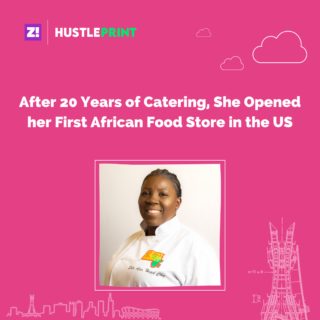After the Nigerian government and people who eat semo, inflation is up there among the reasons living in Nigeria is a struggle. The others are heat, fuel scarcity or the fact that you don’t own a pet goat.
If you’re unfamiliar with the term, inflation describes the increasing price of goods and services. When people’s salaries aren’t increasing, that’s where the real problem is. In more Nigerian terms, inflation is the reason sardine is gold. In the past three years, the price of sardine has moved from ₦180 to ₦600. In the middle of all this, ₦10k in 2019 feels like ₦1k in 2022. Do you get the flow? Whenever prices skyrocket, that surge is an increase in inflation.

RELATED: 5 Nigerians Talk About Navigating Inflation
So, how are business owners managing the ever-increasing cost of goods? In this article, eight small-business owners talk about navigating inflation.
1. “Shipping and clearing fees are the absolute ghetto”
— Wigmaker
I’ve been running my wig business since 2017. Typically, I order hair from Vietnam, so the value of Naira affects me badly. Since 2017, the exchange rate has moved from ₦300 to $1 to about ₦360 to $1 in 2019 and now, we’re trading at ₦450-₦500 to $1.
In 2019, when I shipped goods worth 10kg, I was charged $5-$7 per kg. It wasn’t cheap, but at least it was easier to cover the cost than it is now. I could buy the weaves at ₦40k and add in ₦30k-₦40k to sell at profit to also cover my shipping and clearing cost. Now, I can barely do that.
RELATED: Nigeria’s Inflation Rate Has Hit A New High. Here’s What That Could Mean For Everyone
In 2021, my shipping cost moved from a maximum of $7 to $12 for the same 10kg of hair. There were times I had to work at an exchange rate of $570-$620. That’s almost double my initial cost for shipping and clearing goods in 2019. I struggled to cover the cost and, my profit margin plummeted. From buying weaves at ₦40k in 2019, it’s doubled to ₦90k by the middle of 2021. Now, I sell based on pre-orders. It’s the only way to avoid buying so many weaves and selling very few in a matter of months. Honestly, the situation is tough.
2. “I’ve gone from buying butter at ₦8k to ₦ 18k”
— Baker
Right now, raw materials have doubled or tripled in price. For instance, in 2018 I used to buy a tub of butter for ₦8k- ₦ ₦10k. Now, I buy the tub for ₦18-₦20k. Raw materials are also scarce because brands can’t afford to manufacture at the same rate. People now produce counterfeit or low-quality products to maintain customers. In 2022, it takes a good baker to identify the fake products in the market.
I’ve lost customers because of the review in my price, and getting more has been so difficult. In 2018, people typically ordered cakes and small chops for fun. Now? No one orders a cake or box of small chops for leisure. If it’s not an important event like a birthday or anniversary, demand is quite low.
My profit margin has significantly decreased. It’s either I’m covering the cost on my end, or not getting customers at all. Even when Nigerians order, it’s budget cakes — ₦10k, ₦12k — anything more doesn’t happen as much. I can’t even think of expanding as a business. Beyond the poor market, I can’t think of buying an industrial oven with my account balance. The business will suffer.
3. “There are no customers for us to cover the cost of rent”
— Salon owner
Two years after losing my bank job, I decided to open up a saloon in 2013. I wasn’t interested in making hair, I only wanted to sub-let to hairdressers and barbers. The rent was about ₦600k, and I was sub-letting for ₦20k per month. People flocked at the offer — I got six hairdressers, a nail technician and two barbers. As the years went by, the rent increase. I moved from paying ₦600k to ₦800k in five years.
By then, the price for each space gradually increase. 2018, half of the hairdressers couldn’t cover the cost and left. We went from busy weekdays and weekends to barely any customers during peak hours on a Saturday. Eventually, we were down to three people. Currently, my rent is ₦800k. My profit margin moved from nearly ₦150k in 2013 to barely ₦100k between the three people currently in the saloon. Some months I have to overlook the payment because honestly, there are no customers for them.
RELATED: #NairaLife: She’s 22, and She’s Changing Careers for the Third Time
4. “To keep my customers, I sell cooking gas based on how buoyant a person looks”
— Gas retailer
In 2009, I started selling cooking gas. When I started, gas was selling at ₦2k for 12.5kg and ₦9k-₦10k for the 50kg. Now, 12.5kg is going at ₦7950 and the 50kg is ₦31,800. That’s even when the gas is filled. For the empty cylinders, the 12.5kg was ₦6k-₦8k, while the 50kg cylinder was ₦26k-28k. Now, those 50kg cylinders are sold from ₦40k upwards. How do the retailers gain any profit? My profit margin was at least ₦1k in 2009 and relatively stayed the same because customers won’t buy if the gas is too expensive. So I’m earning the same thing in an economy where ₦1k is like ₦100.
To push it up a bit, I started selling based on how buoyant a customer looked. If you’re a rich man or woman, I’ll add the ₦500 another person can’t pay inside your cost. Since the economy doesn’t favour me, I have to find a way to keep customers.
5. “Fruits are like gold in the market”
— Juice seller
When I started selling fresh juice with my mum, we were selling a bottle for as low as ₦350-400. That was 2020. While we were using recycled bottles, we were making a profit of ₦200 per bottle. Then we began to make branded bottles and it dropped to about ₦120-₦150. It’s been two years since we started and we had to review our prices in January 2020. Between the fire incident at the store and the cost of fruits like pineapples and oranges, it was inevitable. The plan was to always maintain our price at ₦500 per bottle now, it’s going from ₦1k-₦2k. With the cost of production, it’s impossible.
6. “Stop swearing for tailors”
— Fashion designer
I’ve been a fashion designer since 2013. Although I took breaks in between to focus on my family, I ran my business on the side. The cost of production has continuously, but this fuel scarcity has made my life miserable. My transformer blew and now I’m at the mercy of NEPA. When there’s no light, I still need to run my light machines, so buying fuel is inevitable.
Now, I’m buying fuel at ₦400 per litre and my earnings from the clothes I’m currently sewing, won’t cover that cost. Logistics is also expensive and customers aren’t patient enough to understand. In a matter of months, I’ve had to review my prices. I can’t even afford to buy an industrial machine I was able to afford in 2018. Now, it’s ₦140k — double the initial price.

7. “Customers need to understand, we’re in a pandemic of our own”
— Restaurant owner
In 2019, I started my restaurant business in university. By March 2020, I was able to expand into a bigger space in uni, but the pandemic shut us down within weeks. Deliveries were the only way to keep running. At that point, prices of foodstuffs were already going up, but I didn’t want to review my prices. Students were our main customers, so increasing prices would have been detrimental. 2021 was a whole other level for us. We went from paying about ₦300 per litre for diesel in 2020 to about ₦400 in 2021. Last week it was ₦510. Now, it’s ₦555. That’s more than a 50% increase on diesel alone. Imagine the cost of electricity bill or foodstuff?
While the prices go up, we still have the government coming down our throats with tax. The situation is appalling. It feels like business owners are going through another pandemic on their own.
8. “I have to pay my staff out of pocket”
— Hairdresser
I’ve had a shop at Garki market, Abuja, for ten years. The service charge used to be ₦15k per year in 2012 and now, it’s ₦30k. The saving has been my landlord not increasing rent. However, keeping up with my staff’s salary is difficult. When I got my first set of staff in 2015, I was paying them ₦12k- ₦19k depending on their location. Now, it’s not even significant to how much they spend on transport. I’ve had to review their salary to ₦20k- ₦25k. In the bad months, it’s out of my pocket.
ALSO READ: NaireLife: This 36-Year-Old Lecturer Is Also a Photographer, Marketer And Full-Time Husband




